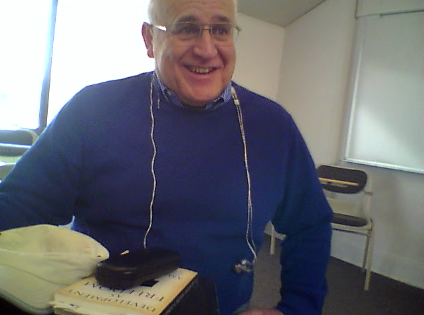
I kept apologizing as I struggled to set up the camera. I got it from the library and camera stands were foreign to me.
Mr. Bates was patient. He told me about his three cats, “One keeps jumping up on the counter and I want to set up a camera so I can figure out which is doing it,” he said, smiling.
I remembered my first impression of Bates. His voice was stern; his presence was commanding.
He could recite statistics from memory, he could bring a story to life and make you care.
Bates’ speech is full of thoughtful pauses, deliberate choices of words. He makes hand gestures while he talks and his eyes look off to the right when he tells stories. His voice trails off…
Bates has a unique teaching style. He highlights students’ strengths, tells exciting stories, and most importantly strives for patience and understanding. He developed this style through his teachers and from seeing tragedy in the lives of others.
His first teaching experience was the boys section of bible school from when he was 9 to 16.
After he turned 16 he went off to college and collected various degrees. He has history degrees from the Virginia Commonwealth and the University of Florida. His literature degrees are from George Mason University and Miami of Ohio University in Literature.
He also has a Ph.D. from the University of Texas at Austin in American Studies. His favorite college is the University of Miami because it gave him the most scholarship money.
His degrees boost his core subject, Symbolic Intersectionalism, “a study of systems, the why and how of human interaction, leadership if you want. Why things happen the way they do.”
Mr. Bates taught in 12 colleges and universities in six states and settled into Bucks in 1990. He’s taught sociology, History (American/World/Medicine), literature, and composition.
From the way Bates talked about his mentors I could really tell how they rubbed off on him. “I went to college when I was 16, really too young for college. Dr. Greer picked me out of a crowd…He helped me apply to grad school.
It helps to have someone who knows.” Bates told this story during our class and surely many classes before. He often offered students help from someone who knows.
The way Bates told his story about Dr. Woodruff, another former teacher, gave another glimpse at the influence.
“Dr. Woodruff was a crusty fellow punctuation goes inside quote’s” he stressed repeatedly. “He was a small fellow, and I’m 5’7. He fought in Italian campaign during World War II… He helped me do what I can do, simply because he could.”
Bates shook his head and his voice got louder. “He was a frightening guy. One day I was minding my own business and he comes straight at me. He picks up the entire desk, throws the desk while a student is still in it.”
Mr. Bates got out of his chair and threw the pretend desk.
“He wakes up dazed as he hits the wall. ‘Nobody goes to sleep in my class!’” He broke out laughing.
Bates calls his teaching style extemporaneous. He tailors it to the moment based on the context of what he is teaching at the time.
Bates believes the most important thing a teacher can have is patience. “Most of my peers don’t tell students what they do well, but what they do not do well instead. I try to highlight at least one thing they do well. Don’t just criticize, pay close attention.”
Teaching in church taught him you can’t assume anything.
“There was a Sunday school teacher named Ms. Aleshire. I was fond of Mrs. Aleshire. What I did not know was that her husband was a drunk and beat her. Her son, who was my age, was difficult and I didn’t understand why at the time. You don’t know what goes on in someone else’s life. It’s not productive to judge, exclude, and demean without understanding.”
Stories about his former students weigh on him.
Some of his former students were drug addicts. Bates almost threw one woman out of his class. He referred to her as, “a royal pain in my class.”
She tormented another student by accusing her of stealing without proof. He spoke with her forcefully and she apologized. “She told me later on that she was a drug addict because of something that she had not reconciliation for, she was raped.”
He bit his lip while delivering this news to me.
The student brought him a gift. This was very unusual because it was not Christmas.
“Usually I watch people very close,” He switched from looking off the right and made eye contact.
“I notice that there is something under her sleeves. She’s got track marks up and down both of her arm.”
He hovered his hands over his arms as if the marks were on his own.
“She burned herself with cigarettes.” As Bates put down his arms I could hear the clink of his wrist watch on the chair.
The girl had given him ceramic cups, an inexpensive gift, but expensive to someone without much money.
She killed herself that week.
“The most important thing I can teach my students is to not take responsibility for things that were done to you, don’t apologize for these things. If someone rapes you it’s not your fault, and taking responsibility is most always a mistake,” he said, nodding his head slightly.
“Students have trauma. Some succeed in addressing it, some do not. I try to help them find a way if I can.”

